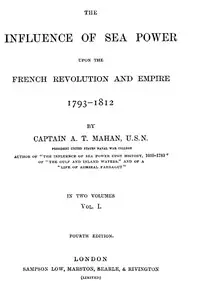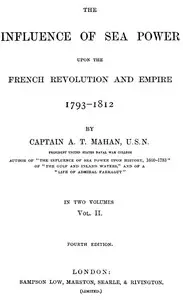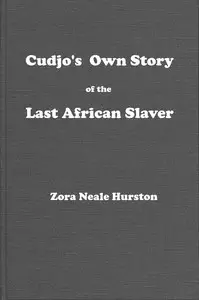"Sea Power in its Relations to the War of 1812. Volume 2" by A. T. Mahan is a late 19th-century historical analysis that spotlights sea power's critical role in the War of 1812, particularly focusing on important sea battles and the large-scale effects of having control of the seas. It examines how naval dominance impacted battle results while thinking about what can be learned from the relationship between marine planning and fighting. The book starts with a close look at naval actions during the winter of 1812-1813, featuring Commodore William Bainbridge's strategic moves, and studying naval conflicts like those between the "Constitution" and the "Java," and the "Hornet" and the "Peacock." The author also points out the growing British blockade of the Atlantic coast and how it held back American naval activities, which helps readers understand the larger sea-based forces and strategic ideas at play during the war.

Sea Power in its Relations to the War of 1812. Volume 2
By A. T. (Alfred Thayer) Mahan
Control of the seas dictates dominance in a crucial war, spotlighting clashes and strategic naval actions.
Summary
About the AuthorAlfred Thayer Mahan was a United States naval officer and historian, whom John Keegan called "the most important American strategist of the nineteenth century." His 1890 book The Influence of Sea Power Upon History, 1660–1783 won immediate recognition, especially in Europe, and with the publication of its 1892 successor, The Influence of Sea Power Upon the French Revolution and Empire, 1793–1812, he affirmed his status as a globally-known and regarded military strategist, historian, and theorist. Mahan's works encouraged the development of large capital ships — eventually leading to dreadnought battleships — as he was an advocate of the 'decisive battle' and of naval blockades. Critics, however, charged him with failing to adequately explain the rise of largely land-based empires, such as the German or Ottoman Empires, though Mahan did accurately predict both empires' defeats in World War I. Mahan directly influenced the dominant interwar period and World War II-era Japanese naval doctrine of the "decisive battle doctrine" , and he became a "household name" in Germany. He also promoted American control over Hawaii though he was "lukewarm" in regards to American imperialism in general. Four U.S. Navy ships have borne his name, as well as various buildings and roads; and his works are still read, discussed, and debated in military, historical, and scholarly circles.
Alfred Thayer Mahan was a United States naval officer and historian, whom John Keegan called "the most important American strategist of the nineteenth century." His 1890 book The Influence of Sea Power Upon History, 1660–1783 won immediate recognition, especially in Europe, and with the publication of its 1892 successor, The Influence of Sea Power Upon the French Revolution and Empire, 1793–1812, he affirmed his status as a globally-known and regarded military strategist, historian, and theorist. Mahan's works encouraged the development of large capital ships — eventually leading to dreadnought battleships — as he was an advocate of the 'decisive battle' and of naval blockades. Critics, however, charged him with failing to adequately explain the rise of largely land-based empires, such as the German or Ottoman Empires, though Mahan did accurately predict both empires' defeats in World War I. Mahan directly influenced the dominant interwar period and World War II-era Japanese naval doctrine of the "decisive battle doctrine" , and he became a "household name" in Germany. He also promoted American control over Hawaii though he was "lukewarm" in regards to American imperialism in general. Four U.S. Navy ships have borne his name, as well as various buildings and roads; and his works are still read, discussed, and debated in military, historical, and scholarly circles.
















